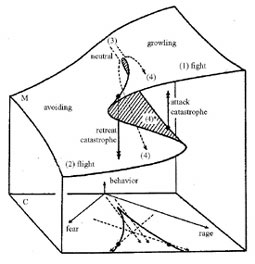Gizmo: "There are no general laws of human relationships as there are for physics, but a leading marital researcher and group of applied mathematicians have teamed up to create a mathematical model that predicts which couples will divorce with astonishing accuracy. The model holds promise of giving therapists new tools for helping couples overcome patterns of interaction that can send them rushing down the road toward divorce.
Psychologist John Gottman and applied mathematicians James D. Murray and Kristin Swanson will describe how the model was developed and how it enables Gottman to predict with 94 percent accuracy which couples will divorce after viewing just the first few moments of a conversation about an area of martial contention. They will discuss their work today at a press briefing during the annual meeting of the American Association for the Advancement of Science in Seattle.
'When Newton invented calculus it put science on a mathematical foundation and physics really took off,' said Gottman who is a University of Washington emeritus professor of psychology and director of the Relationship Research Institute. 'But psychology is a field that has lagged behind in using mathematics and there is no math in social psychology.'
Murray, who is an emeritus professor of applied mathematics at the UW and Oxford University, agreed, noting that a lot of people are phobic about mathematics and that psychology has not been exposed to models.
'What we did is extract key elements into a model so that it is interpretive and predictive,' Murray said. 'The mathematics we came up with is trivial, but the model is astonishingly accurate.'

The model was developed using data collected from hundreds of videotaped conversations between couples in Gottman's laboratory. Physiological data, such as pulse rates also was collected and analyzed. The conversation reflected underlying problems the couple had and that is why the model is so predictive, according to Murray.
'Before this model was developed divorce prediction was not accurate,' Gottman added, 'and we had no idea how to analyze what we call the masters and disasters of marriage "
jaynote: This American Life had a good interview with Gottman and from 1999 on NPR
Psychologist John Gottman and applied mathematicians James D. Murray and Kristin Swanson will describe how the model was developed and how it enables Gottman to predict with 94 percent accuracy which couples will divorce after viewing just the first few moments of a conversation about an area of martial contention. They will discuss their work today at a press briefing during the annual meeting of the American Association for the Advancement of Science in Seattle.
'When Newton invented calculus it put science on a mathematical foundation and physics really took off,' said Gottman who is a University of Washington emeritus professor of psychology and director of the Relationship Research Institute. 'But psychology is a field that has lagged behind in using mathematics and there is no math in social psychology.'
Murray, who is an emeritus professor of applied mathematics at the UW and Oxford University, agreed, noting that a lot of people are phobic about mathematics and that psychology has not been exposed to models.
'What we did is extract key elements into a model so that it is interpretive and predictive,' Murray said. 'The mathematics we came up with is trivial, but the model is astonishingly accurate.'

The model was developed using data collected from hundreds of videotaped conversations between couples in Gottman's laboratory. Physiological data, such as pulse rates also was collected and analyzed. The conversation reflected underlying problems the couple had and that is why the model is so predictive, according to Murray.
'Before this model was developed divorce prediction was not accurate,' Gottman added, 'and we had no idea how to analyze what we call the masters and disasters of marriage "
jaynote: This American Life had a good interview with Gottman and from 1999 on NPR
Comments